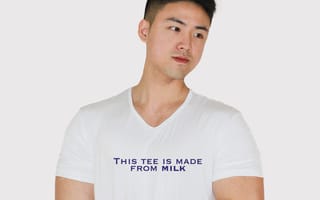
In 2018, Robert Luo traveled to his uncle’s dairy farm in Qinghai province, on the northwest edge of China near Mongolia. When he arrived, he was startled to see buckets of curdled milk lying stagnant around the otherwise clean growing facility. Luo’s uncle complained about the smell — and the waste. Luo reflected on his favorite maxim, “Whenever someone complains, that’s an opportunity,” and the serial entrepreneur began researching how to fight food waste.
“It was the first time I investigated the impact of food waste in agriculture and how it applies to climate change,” Luo told Built In. “I realized this is a huge problem that we just don’t talk about enough.”
After three months of research, Luo stumbled on a decades-old process of spinning spoiled milk protein into fibers that can be used to make clothing, packaging material, medical supplies and more. He’s since devoted the last two years to commercializing the venture, which today has taken the form of a company called Mi Terro. The five-person LA startup is currently hiring for three engineers. It aims to rescue the more than 128 million gallons of spoiled milk wasted every year from going down the drain.
Mi Terro recovers spoiled dairy products from farms, food processing centers and grocery stores and extracts protein molecules from the bacteria grown. The company has then adapted a system developed in 1930s Germany that mixed spoiled milk proteins with acrylic to develop a substitute for cotton, Luo said. In an update to the process that inspired it, Mi Terro spins the curdled proteins into fibers that are completely biodegradable. The company claims its process uses 60 percent less water than spinning organic cotton.
“We use only food waste,” Luo said. “We’re not encouraging people to drink more milk or to buy more dairy products. In fact, we’re raising awareness that we were wasting too much of it.”
Luo said the company aims to make reducing food waste to be as easy as putting on a T-shirt.
To that end, the biotech startup has launched a line of fashionable tees for men and women, along with boxers and bags. The shirts start at $39.50 apiece and, so far, the company has generated $100,000 in online sales from customers in more than 40 countries. Mi Terro has also partnered with brands like Nike, Pingan, XRC Labs and more.
As the COVID-19 pandemic persists, Luo said the company’s work is more critical than ever since restaurants, hotels and schools have canceled their milk orders.
“Farmers are dumping milk like crazy,” Luo said. “They have nowhere to distribute their milk. Our technology can come in and give them a new stream of income that was once impossible.”
Mi Terro is currently looking into spinning new types of fiber from excess soy milk, as well as using dairy milk to create an alternative to plastic.
The startup represents the third venture for Luo. When he was a sophomore in college, Luo said he sold his UBI Technologies streaming platform to a Chinese company for $300,000, and he’s also sold a social impact app he developed to an angel investor for an undisclosed amount. Mi Terro is now in the process of raising $800,000 in funding, Luo said, ideally from companies in China. The startup has so far raised $150,000 in seed cash.
“Looking for a problem to solve, that’s always my instinct,” Luo said.




